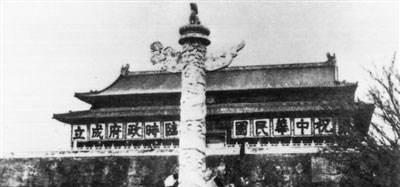Dingdu refers to the ancient determination of a place as the capital or major city. Since ancient times, rulers have attached great importance to the matter of fixing the capital. As we all know, the capital of the Republic of China in the early period was Beijing, which became Nanjing in 1928, and later Chongqing, and there were many setbacks in between.

At the beginning, Sun Yat-sen considered economic development and political consolidation, and proposed that Wuchang be the capital of the Republic of China. Because Wuhan is at the center of China, it is connected to China in all directions. As the places where the capitals will be built in the future, the four cities of Chongqing, Nanjing, Jiangning and Beijing were the centers of the development of the southeast, southwest, and northwest at that time. The core members of the local core and the government all advocated that the capital be set in Wuchang, and after consultation, it was decided that Nanjing, which had richer products, was more suitable as the capital, so the Government of the Republic of China set the capital nanjing. At that time, Sun Yat-sen was abroad, and when he returned to China, the matter of Dingdu had become a boat.
On October 10, 1911, the revolutionaries successfully launched the "Wuchang Uprising" and formed the Provisional Government of the Republic of China. On January 1, 1912, Sun Yat-sen was sworn in as the first democratic republic in Asia, the Republic of China, and the establishment of the capital was put on the agenda. Sun Yat-sen insisted on making the capital Nanjing, but this proposal was opposed by people led by Yuan Shikai, who demanded that the capital be Beijing.
More than a month later, Sun Yat-sen offered his resignation, but demanded that the capital of the Provisional Government of the Republic of China must be Nanjing, and also pointed out the advantages of making the capital Nanjing. The backbone of the Republic of China government, taking into account the security of the government, proposed that the capital be Nanjing. Yuan Shikai insisted on making Beijing the capital of the Republic of China and threatened Sun Yat-sen by refusing to take office. Some of Sun Yat-sen's confidants also supported Yuan Shikai, and he was helpless and angry about this. At that time, there were still many people who supported Sun Yat-sen, such as the eight major societies of the Republic of China, who jointly supported his decision to set the capital in Nanjing.
Yuan Shikai would have easily given up, so he planned a "mutiny" incident. On February 21, the Republic of China government sent Cai Yuanpei and others to Beijing to invite Yuan Shikai to return to Nanjing to take up his post. After Cai Yuanpei and his party arrived in Beijing, Yuan Shikai launched a mutiny to create chaos, and they had to flee Beijing in a hurry. The mutiny then spread to Baoding and Tianjin, the areas around Beijing. Yuan Shikai pretended to tell Sun Yat-sen about this matter, and after a meeting of the Republic of China government, it was decided to send troops to the Northern Expedition.
In early March, Yuan Shikai suddenly informed the Republic of China government that the mutiny had been quelled, and that the mutiny had come and gone quietly and was suspicious. After the mutiny, newspapers in various places, people from all walks of life, and the Nanjing government said that the capital should be Beijing, and President Yuan Shikai could not leave Beijing for half a step. All this is directed at Sun Yat-sen, how could he not understand?
In the end, Sun Yat-sen compromised, and Yuan Shikai won the political struggle by playing conspiracy. In April 1912, Sun Yat-sen resigned, the Provisional Senate elected Yuan Shikai as the provisional president, and the capital of the Republic of China was moved to Beijing, and from then until 1928, it was called the "Beiyang Period", and the government of the Republic of China in this period was called the "Beiyang Government".